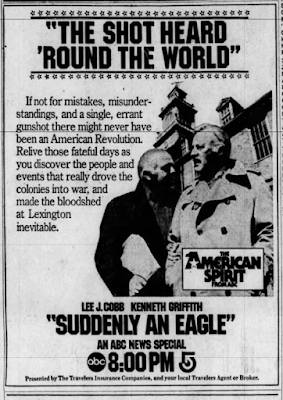From the Archives: A Confused Counterfactual about the American Revolution, “Suddenly an Eagle” (1976)
Some of the source material I've been looking at for my history of counterfactual history will regrettably, but inevitably, end up on the cutting room floor. For any number of reasons, the material just doesn’t fit into the chapter it was originally intended.
One example is an advertisement I ran across the other day for an ABC television documentary called "Suddenly an Eagle" that was broadcast in 1976 during the hoopla surrounding the Bicentennial. (I was in third grade at the time and recall making a papier maché puppet of George Washington for my favorite elementary school teacher, Mrs. Bustillo).
Anyway, the advertisement sought to capitalize on the many “what ifs?” that were floated in the American media at the time: “What if the French had not supported the revolution?” “What if the revolution had failed?” “What if George Washington had been captured by the British?” “What if he had become a King instead of a president?”
Unfortunately, the documentary's writers and producers were unclear on how the counterfactual game is played.
On the one hand, the advertisement embraced the reality of contingency, declaring that “if not for mistakes, misunderstandings, and a single, errant gunshot there might not have been an American Revolution.”
Fine so far….
But then the advertisement concludes with the deterministic assertion that “the bloodshed at Lexington was inevitable.”
What gives? Simple ignorance? A bait and switch?
I haven’t seen the broadcast, but the cognitive dissonance visible in the promotional material may explain why the show’s ratings were apparently dismal.



Comments
I haven't seen this documentary, either, but I don't think the ad is actually inconsistent. The first sentence posits, "If it weren't for this, that, and the other, there might never have been a Revolution." But, the second sentence tells us, there WERE this, that, and the other -- to wit, "the people and events of those fateful days," which included "mistakes, misunderstandings, and a single, errant gunshot" -- and because there were, they made the bloodshed at Lexington inevitable.
I grant you it's not great copy, but I don't think it's logically inconsistent.
= D.E.T.
(Baltimore /// Tuesday - September 19th, 2023)
http://en.wikipedia.org/wiki/Alternate_history